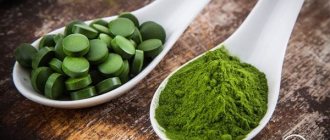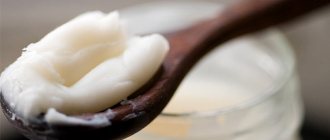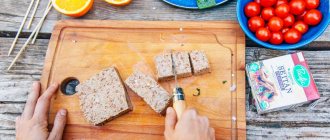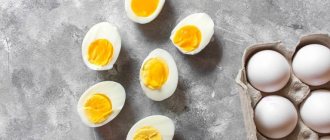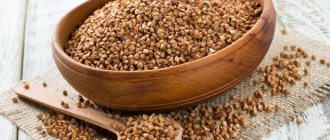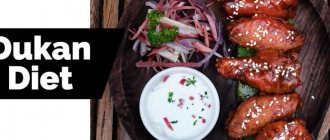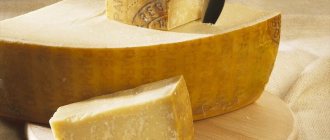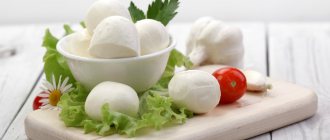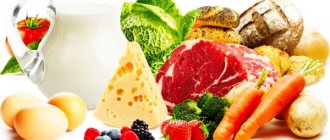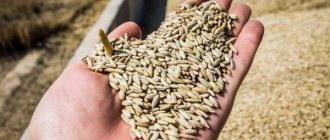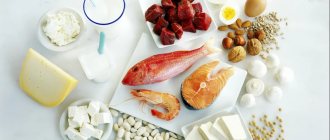Proteins for the human body. Useful properties of proteins, meaning, functions
Proteins and products containing protein play an important role for the body and human health, and a balanced and good diet is the key to excellent well-being .
To stick to proper nutrition, you need to know which foods contain protein.
It has long been known that the human body consists of 14.7 percent proteins , since proteins are an important element in the human body. They influence the processes of growth, digestion, reproduction, and are the basis of antibodies, hormones and various enzymes.
Proteins are of plant origin and also of animal origin, and it is the latter that are more important for the body; they are digested faster and better absorbed. Plant proteins are more difficult to digest due to their fiber shell (it is this fiber that interferes with digestive enzymes and delays the entire process).
What foods contain proteins?
Protein foods are divided into animal and vegetable protein.
Animal proteins contain all the amino acids you need. Moreover, you get the required amounts of vitamins B12 and D, calcium, iron, zinc, Omega-3 fatty acids.
On the other hand, red meat, for example, contains saturated fat and cholesterol. Excessive consumption of red meat, according to nutritionists, is associated with increased mortality from cardiovascular diseases and oncology. Therefore, it is recommended to consume red meat no more than three times a week. Frankfurters and sausages are even rarer.
However, there must be moderation in everything! There is no need to give up such products, but there is also no need to eat in unlimited quantities.
And also do not forget about products such as egg whites and dairy products . These are the best sources of animal protein , in terms of biological value.
Protein of plant origin is considered especially valuable. The reason is that in addition to protein, you get fiber, vitamins and microelements, and the most healthy unsaturated fats. At the same time, it is worth remembering that it is difficult to fully replace animal products.
Only soy protein is complete. Therefore, it is better to combine both. The ideal ratio is 60% animal - 40% plant.
Is it possible to eat only proteins?
Protein diets are useful for those who want to lose weight, but you need to know in moderation. Doctors and nutritionists do not recommend eating exclusively proteins, since their excessive consumption does not have a positive effect on the body, but, on the contrary, negatively, leading to problems with the liver and kidneys.
This is especially harmful for children, since their diet should include a variety of foods and a balanced diet. If children are fed only protein foods, they may experience growth retardation.
Slow and fast proteins
Slow proteins are proteins with a large amount of calories that cannot be absorbed quickly, only over a long period of time. Also, the body spends more energy on their processing.

Fast proteins are proteins that are absorbed by the body in a short amount of time, mainly animal products.

Fast proteins are useful for those who play sports or lead a very active and active lifestyle with a lot of physical activity.
List of foods with “slow” protein
Products:
- Soy.
- Polka dots.
- Buckwheat.
- Corn.
- Rice.
- Beans.
- Wheat.
- Oats.
- Rye.
- Peanut.
List of foods with “fast” protein
Products:
- Milk (cow's).
- Chicken eggs.
- Cheese products.
- Curds.
- Kefir.
- Beef.
- Chicken meat.
- Lean pork.
- Some types of fish.
Top 15 Sources of Plant Protein
More and more people around the world are interested in switching to vegan/vegetarian diets. It becomes easier to avoid consuming animal products thanks to more fortified and nutritious plant foods.
The right plant foods can be excellent sources of protein and other nutrients, often with fewer calories than animal products.
- Tofu, tempeh and edamame
Soy products are among the richest sources of protein in a plant-based diet. The protein content depends on how the soy is prepared:
- firm tofu (bean curd) contains about 10 grams of protein per ½ cup;
- edamame beans (immature soybeans) contain 8.5 grams of protein per ½ cup;
- Tempeh contains about 15 grams of protein per ½ cup.
These soy products also contain high amounts of calcium and iron, making them a healthy alternative to dairy products.
- Lentils
Red or green lentils are high in protein, fiber, and essential nutrients, including iron and potassium.
Cooked lentils contain 8.84 grams of protein per ½ cup.
Lentils are an excellent source of protein that can be added to stews, curries, salads or soups for an extra dose of protein, or cooked as a side dish on their own.
- Chickpeas (chickpeas)
Cooked chickpeas contain about 7.25 grams of protein per ½ cup.
There are many recipes for cooking with chickpeas. One of the popular ones is hummus, which is made from chickpeas.
- Peanut
Peanuts are rich in protein, full of healthy fats and will help improve heart health. It contains about 20.5 grams of protein per ½ cup.
- Almond
Almonds offer 16.5 grams of protein per ½ cup. It is also rich in vitamin E, which is great for the skin and eyes.
- Spirulina
Spirulina is a blue or green algae that contains about 8 grams of protein per 2 tablespoons. They are also rich in nutrients such as iron, B vitamins.
Spirulina is available online in powder or supplement form. It can be added to water, smoothies or fruit juice. A person can also sprinkle it on salads or snacks to increase their protein content.
- Quinoa
Quinoa is a high protein grain and contains all 9 essential amino acids. Cooked quinoa contains 8 grams of protein per cup. This grain is also rich in other nutrients, including magnesium, iron, fiber and manganese. Quinoa can be used in soups and stews, sprinkled over salads, or cooked as a main dish.
- Mycoprotein
Mycoprotein is a mushroom-based protein. Mycoprotein products contain about 13 grams of protein per ½ cup.
Microprotein products are often promoted as meat substitutes and are available in forms such as "chicken" steaks and cutlets. However, many of these products contain egg whites, so it's worth checking the label.
- Chia seeds
Chia seeds are low-calorie foods rich in fiber and omega-3 fatty acids, which help prevent cardiovascular disease. Chia seeds contain 2 grams of protein per tablespoon.
- Hemp seeds
Like chia seeds, hemp seeds contain protein consisting of all 9 essential amino acids. Hemp seeds contain 5 grams of protein per tablespoon.
- Beans with rice
Rice and beans alone are incomplete sources of protein. Eaten together, they will provide 7 grams of protein per cup.
- Potato
Large baked potatoes contain 8 grams of protein per serving. Potatoes also contain many other nutrients such as potassium and vitamin C.
- Protein-rich vegetables
Many dark vegetables and leafy greens contain protein. These foods are not enough to meet your daily protein needs, but a few vegetable snacks can increase your protein intake, especially when combined with other protein-rich foods.
For example, one medium broccoli contains about 4 grams of protein, kale contains 2 grams of protein per cup, and 5 medium mushrooms contain 3 grams of protein.
- Seitan (wheat gluten)
Seitan is a complete protein made from a mixture of wheat gluten and various spices. Due to its high levels of wheat, it should be avoided by people with celiac disease or gluten intolerance. For others, seitan can be a protein-rich, healthy meat substitute.
When cooked in soy sauce, seitan becomes a complete source of protein, containing 21 grams per 1/3 cup.
- Ezekiel bread
Ezekiel bread is a healthy alternative to traditional bread. It is made from barley, wheat, lentils and millet. Ezekiel bread is a great choice for bread lovers looking for a more nutritious alternative. Ezekiel bread contains 4 grams of protein per slice.
Based on materials from www.medicalnewstoday.com
Foods that are high in protein. List
You can find out which foods contain a lot of protein from the list:
- Meat products and poultry.
- Various seafood, different types of fish.
- All sorts of different fruits and different vegetables.
- Seeds and also nuts.
- A variety of dairy products.
- Eggs (not just chicken).
Meat products, as well as poultry: lean cow meat, chicken meat such as fillet or breast, turkey (fillet is best), rabbit.
Fish, as well as various seafood: salmon, mackerel, shrimp (various).
Fruits and a variety of vegetables: bananas, beans, avocados, spinach.
Seeds and nuts: a wide variety, for example, walnuts or Brazil nuts, hazelnuts and so on.
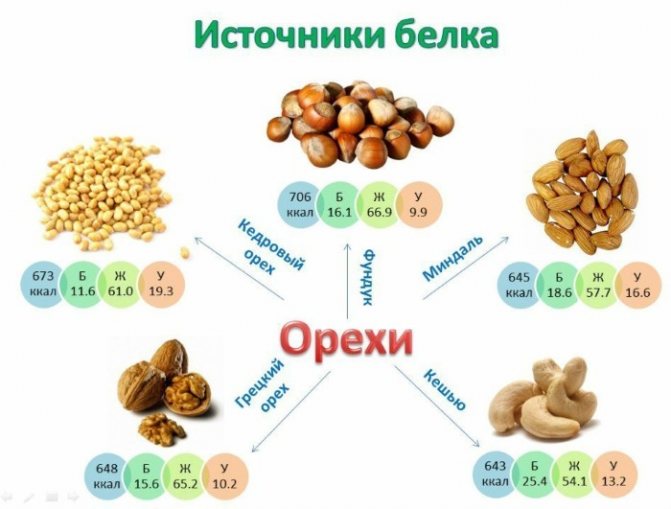
Dairy: cottage cheese, milk itself (cow's), and so on.
Cheeses: a wide variety.
Vegetable protein. Grocery list
The following products will have the greatest amount of vegetable protein:
- Legumes: lentils, etc.
- Nuts: peanuts, etc.
- Various seeds: pumpkin seeds and sunflower seeds.
- Hummus.
- Dried fruits: dried apricots, prunes.
- Fruits: for example, bananas.
Protein with fiber - products
Some products immediately contain both the required amount of protein and fiber, which is very important for the body. These foods include some fruits and vegetables, as well as nuts (hazelnuts or peanut butter if you can't buy nuts) and various seeds.
Nuts and seeds that contain protein
This table below lists the most popular nuts, as well as some seeds that contain protein.
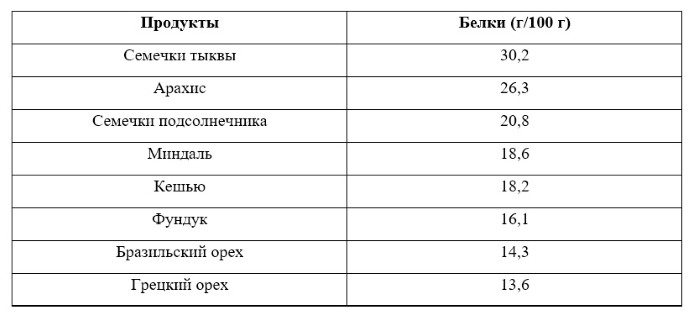
Cereals and legumes that are high in protein
This table shows the most popular cereals and legumes that contain a lot of protein.
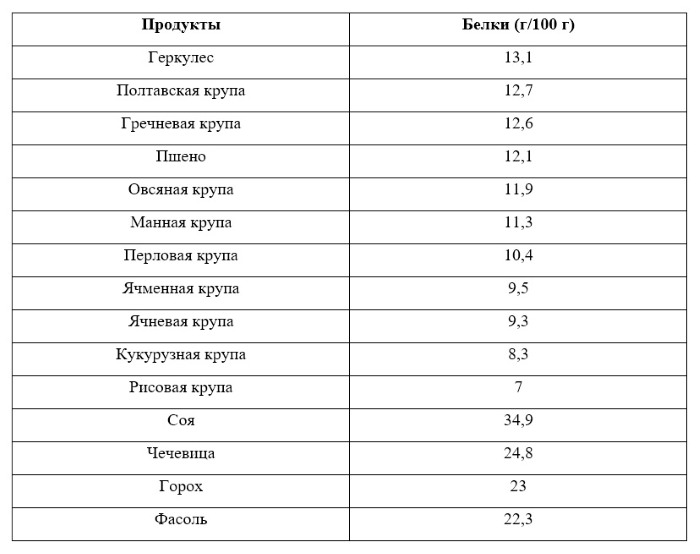
What vegetables contain protein?
Products:
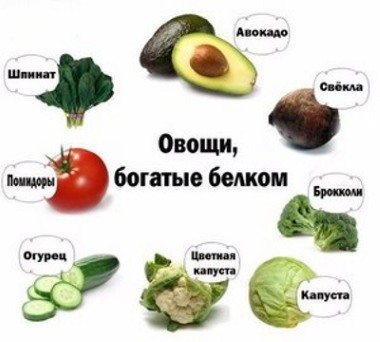
- Brussels sprouts and cauliflower.
- Broccoli.
- Pumpkin.
- Beet.
- Turnip.
- Carrot.
- Celery.
- Bulgarian pepper.
- Radish.
- Swede.
- Tomatoes and tomatoes.
What are proteins? Meaning and main functions in the human body
Proteins (protein) are polymers that consist of amino acids. Proteins contain only 22 amino acids. Thanks to the various combinations of 22 amino acids, thousands of different proteins are built.
The importance of proteins is great. After all, it is the main building material of all organisms . As if all the tissues and organs of your body are built from protein bricks - heart, liver, kidneys, pancreas, blood vessels, muscles, hair, nails, etc.
In addition, proteins perform other important functions :
- Catalytic. Proteins are the main component of all known enzymes.
- Hormonal. Most hormones are proteins.
- Protective. A lack of proteins weakens the protective function because the immune system cannot function adequately.
- Transport. Proteins are involved in the transport of oxygen, carbohydrates, fats, some vitamins and microelements.
Animal protein. Grocery list
The following foods contain the largest amounts of animal protein:
- A variety of meat products.
- Fish.
- Milk.
- Curd products.
- Various eggs.
Meat products
List:
- Lean beef.
- Chicken fillet.
- Chicken breast.
- Turkey meat (fillet is best).
- Rabbit meat.
- Deer meat.
Seafood
List:
- Salmon.
- Tuna.
- Mackerel.
- Sardines.
- Shrimps.
- Lobsters.
- Squid.
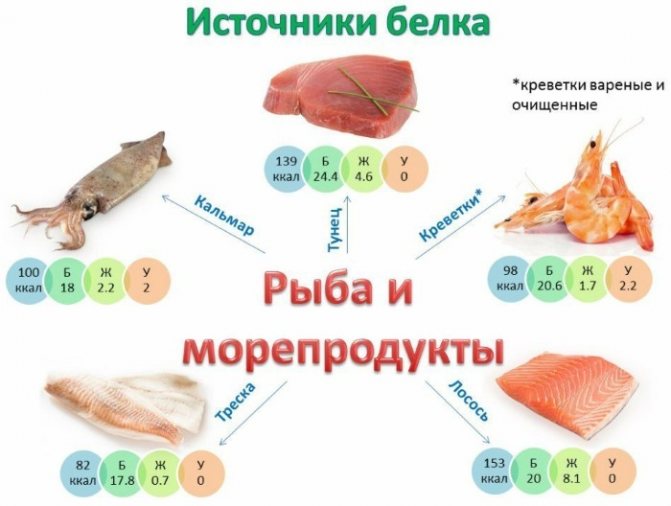
Dairy and fermented milk products
Milk proteins are special natural proteins - proteins of animal origin, which are more easily and quickly absorbed by the human body.
These dairy and fermented milk products include:
- milk,
- curdled milk,
- kefir,
- cheese,
- cottage cheese,
- sour cream.
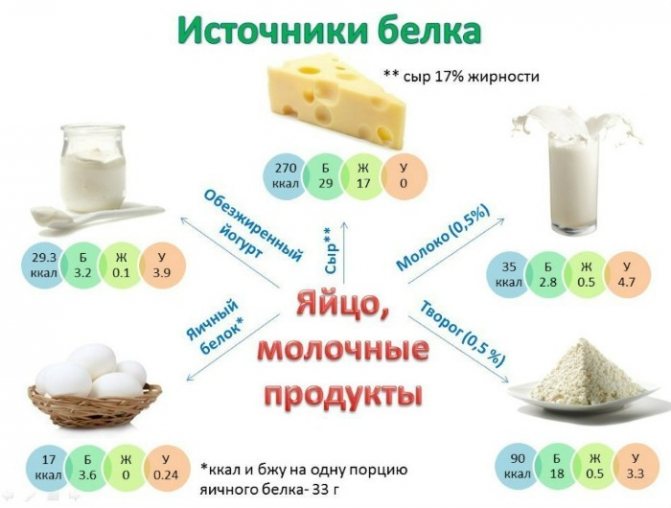
It is these products that should be present in the diet of every person, regardless of his desire to lose weight or build muscle mass.
Milk proteins increase the performance of the entire body, as well as its endurance.
In addition, such proteins are easily digestible due to the fact that they do not change the acid-forming function.
Authorized Products
When using a protein-free diet, the list of foods allowed for consumption is quite large. Depending on your doctor's prescription, you can eat 20-40 g of protein per day. Based on these data, the amount of protein and protein-free foods eaten is determined.
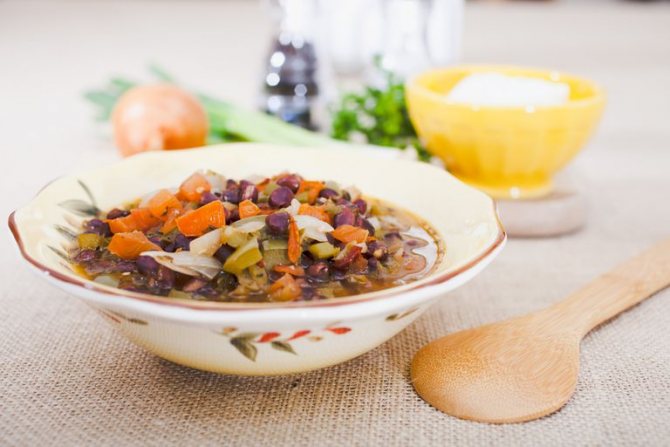
List of foods allowed on a protein-free diet:
- Turkey, beef, chicken, veal. The serving is no more than 55 g per day. The dish can be fried or baked.
- Weak tea, coffee.
- Herbal decoctions, compotes.
- Juices.
- Milk and fermented milk products, cottage cheese in limited quantities.
- Fruits can be eaten raw if there are no other contraindications. Otherwise you can bake it.
- In small quantities you can eat pasta dishes, porridge, peas, beans, beans.
- Butter and vegetable oil.
- Egg white (no more than 1 piece per day).
- Raw or cooked vegetables. Potatoes, carrots, cucumbers, zucchini, beets, cauliflower, broccoli, tomatoes.
- Protein-free bread in the amount of 300 g per day.
- Vegetable broths.
- Soups on the water.
- Low-fat fish, no more than 60 g per day.
When following a diet, salt is prohibited or its minimum amount is allowed. The list of products may vary depending on concomitant diseases.
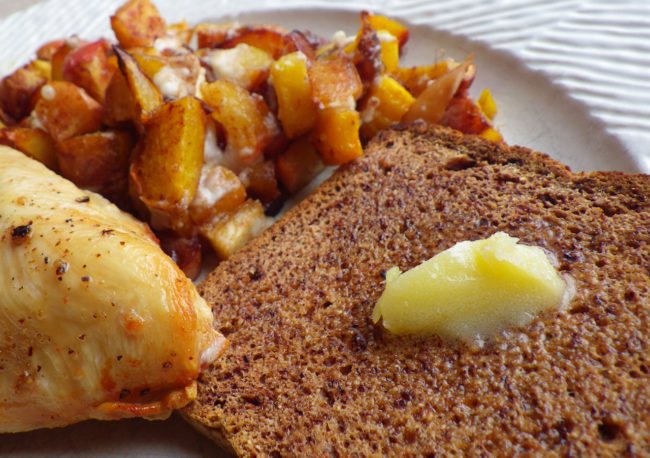
Protein-rich foods for weight loss
What foods contain protein that are recommended to eat when losing weight:
- Dietary meat: it is best to take chicken fillet.
- Fish.
- Some seafood.
- Milk.
- Egg whites.
- Cottage cheese (necessarily low-fat, it is best to take it fresh, from the market, and not in boxes with a long shelf life).
- Cheeses (the fat content of such cheeses should not exceed 25%).
- Soy milk.
- Soy cheeses (including tofu).
Protein diet for weight loss and health. Principles
The protein diet is a special and very effective type of diet, in which the diet of a losing weight person contains only those foods that contain a really large amount of proteins.
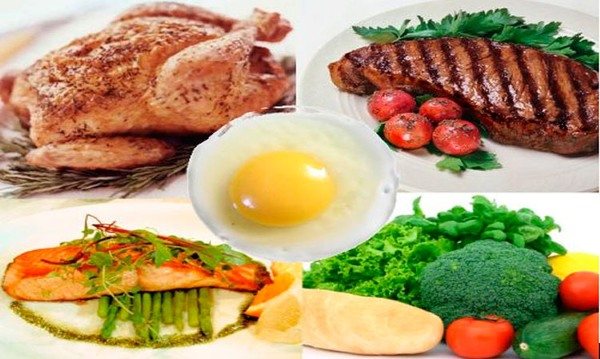
The main advantage of a protein diet is that proteins in the body help carbohydrates to be absorbed faster, thereby maintaining the necessary and stable sugar level in the blood.
At the same time, the body spends more energy for processing , protein is more difficult to digest than the same carbohydrates or fats. That is why this type of diet is considered the most effective for those who are struggling with excess weight.
Benefits of a Protein Diet
The main advantages and benefits of a protein diet are that it muffles the feeling of hunger, which usually always accompanies a person losing weight, and that weight loss is carried out by burning fat, and not by gaining muscle mass.
In addition, this diet is perfect for those who are intensely involved in any kind of sport or simply lead a very active and active lifestyle.
Weight decreases quickly; after finishing the diet, the kilograms do not return, as happens with other diets.
On average, in 2 weeks of such a diet you can lose from 4 to 9 kilograms!
Disadvantages of a protein diet
Despite a fair number of advantages, a protein diet (eating foods that contain protein) also has its disadvantages, of which there are also many.
The biggest disadvantage is that such a diet implies an unbalanced diet, which is not very good for the body. The lack of vitamins can negatively affect sleep and performance (a person will get tired and exhausted faster).
With such a diet there is a very large load on the kidneys.
High consumption of calcium in the body.
A protein diet can negatively affect the functioning and proper functioning of the gastrointestinal tract.
This diet is contraindicated for those who have heart or vascular problems.
List of products and how to create a menu
When creating a menu, it is recommended to choose natural products, preferably lactose-free.
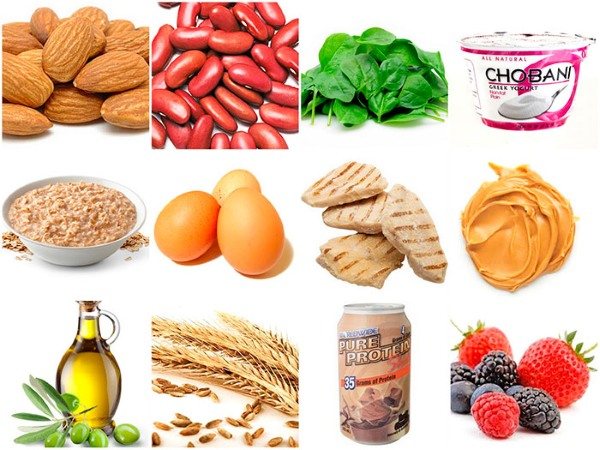
Of the proteins, those proteins that have been subjected to heat treatment are most easily and quickly absorbed.
Grocery list:
- Chicken fillet.
- Veal.
- Rabbit meat.
- Fish with white meat.
- Shrimp, squid.
- Milk.
- Various eggs.
- Curds.
- Cheese.
- Soy cheese.
Sample menu for the week
Monday:
- Kefir, omelet (from 3-4 proteins), drinks – tea.
- The chicken is boiled, you can add spices to it. Apple.
- Fish baked in the oven, 150 g with spices and parsley, dill.
Tuesday:
- A tomato, two hard-boiled eggs, maybe yogurt.
- 100 g of meat, steamed exclusively, salad.
- 150 g of lettuce and cucumber salad.
Wednesday:
- Oatmeal (porridge) with dried fruits or nuts, tea, maybe coffee.
- Chicken breast, boiled, salad.
- Steamed fish, a glass of boiled beans, a glass of yogurt.
Thursday:
- 150 g of natural cottage cheese, tea (preferably green), nuts.
- Chicken broth, chicken breast, vegetables.
- Something meat, definitely baked, salad.
Friday:
- Fresh vegetable salad, yogurt, but only natural and without additives.
- Broccoli soup, boiled chicken breast. Bread.
- Fresh cabbage and pea salad, baked breast (can be topped with cheese).
Saturday:
- Omelet, a little ham, tea.
- 100 g steamed fish.
- Stew of meat and vegetables, yogurt. You can have kefir.
Sunday:
- 150 g of cottage cheese with dried apricots or prunes, green tea.
- Cooked buckwheat, some meat, maybe fish.
- 150 g meat with herbs (baked), kefir.
How to get off a protein diet correctly
In order for the body to experience less stress when leaving the diet, it must be done correctly and gradually.
It is recommended to regularly drink sugar-free drinks and try to eat less sweets and starchy foods.
It is better to have breakfast with porridge (for example, oatmeal) or cottage cheese.
It is recommended to eat more fresh vegetables and fruits.
Contraindications
A protein diet is contraindicated for people suffering from heart or vascular problems, as well as for people who have severe problems with the stomach and digestive process.
This diet is not recommended for those who have problems with the kidneys and liver.
Under no circumstances should anyone who has any type of cancer follow this diet.
It is also not recommended for older people to follow this type of diet, as it increases the risk of blood clots.
How and what kind of proteins to use for muscle growth in bodybuilding
Not only those who want to lose weight, but also athletes who want to build muscle mass take special care when consuming protein.
An athlete's diet should consist of 50% protein , preferably of animal origin; experts recommend consuming about 1.5 or 2 grams of protein per kilogram of weight.
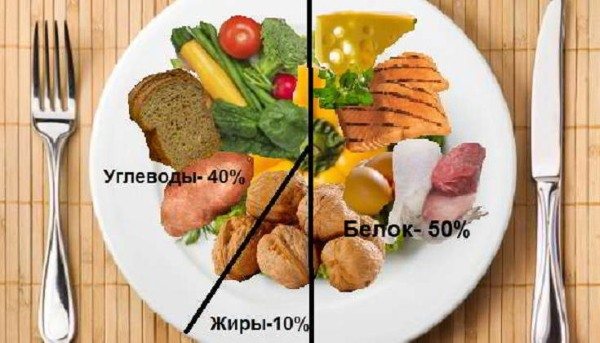
For accelerated muscle growth, it is recommended to consume large amounts of protein foods, as well as special protein shakes.
Popular Protein Foods for Muscle Growth
What foods contain protein and which of them are recommended for those who want to gain exactly the desired muscle mass required for themselves.
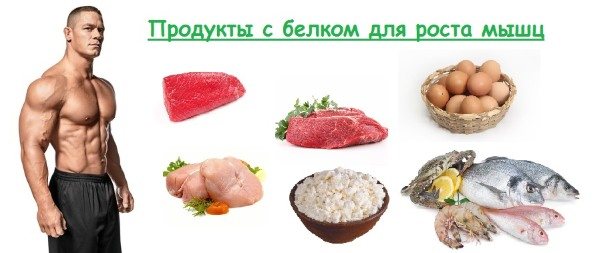
These products include:
- Beef.
- Tuna.
- Cottage cheese.
- Turkey.
- Chicken.
- Eggs.
- Fish.
Protein shakes (recipes)
Recipes:
- Ingredients: 250 ml of fresh milk, you can add 2 or 3 tbsp. l. honey to taste, ripe soft banana, natural yogurt, any oatmeal. Mix all ingredients thoroughly in a blender.
- Ingredients: 100 g of natural fresh (without additives) cottage cheese, 100 g of natural cherry juice, egg white. All ingredients are thoroughly mixed using a blender.
- Ingredients: 0.5 l of milk, 50 g of honey or any jam with a little sugar to taste, 250 g of fresh natural cottage cheese, 100 g of milk powder, 100 g of thick sour cream, dried fruits. The ingredients are mixed in a blender.
How much protein is needed?
Let's say you have selected the most healthy food products. It remains to decide on the appropriate product rate. As a rule, the daily portion should be from 0.8 to 2.5 grams per kilo of weight. A lot here depends on activity, body type, gender, and so on. For example, for a person with a sedentary job, 0.9-1 grams per kilogram of body weight will be enough. As for athletes, the norm increases by 2-2.5 times. As a result, 2.2-2.5 grams of protein are needed per kilogram of weight.
At the same time, you should not take the maximum portion from the very first days - you can start with 1.5 grams per kilo of weight. If there is no effect, then the portion of protein should be increased. Please note that 70-80% of the protein in the diet should be of animal origin, and only 20-30% should be of plant origin. Getting the entire amount of “building material” from food is a very difficult task. Consequently, sometimes it is necessary to supplement the diet with special supplements (the same protein).
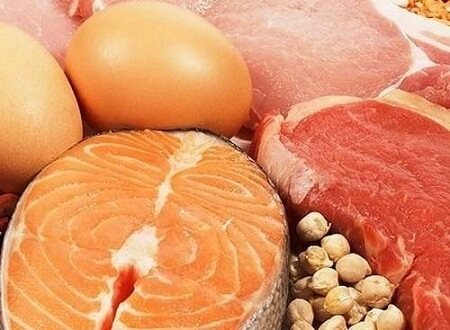
Beginners often believe that taking a larger portion of protein will give them better results. But that's not true. The body is not able to absorb more than 25-30 grams of protein at a time. So there is no need to be zealous in this regard. Moreover, excessive consumption of protein foods can lead to excess fat gain, increased excitability of the central nervous system, and impaired liver or kidney function. However, the muscles will not grow faster.
Popular low protein foods. List
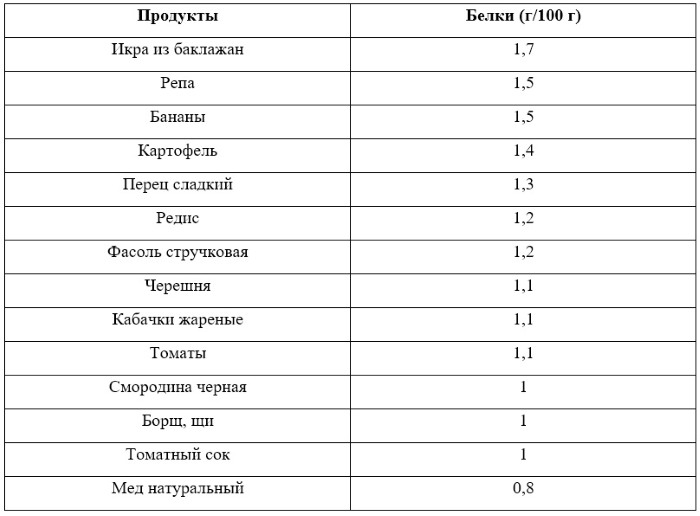
What foods contain protein:
- various milks,
- some types of meat,
- various cereals,
- fruits,
- vegetables,
- seeds,
- nuts,
- fish.
Eating protein and foods that contain protein helps those who are overweight to lose weight, but you can’t eat only protein - this can negatively affect your health, and large amounts of protein should be consumed when the main goal is to gain muscle mass.
Prohibited Products
For those who are recommended to eat protein-free foods, the list of foods allowed for consumption is quite large. But there are still dishes that cannot be eaten at all or with restrictions.
List of prohibited products:
- broths from meat, fish, poultry;
- alcohol;
- carbonated drinks;
- animal fats, lard;
- confectionery;
- baking
Products that are partially prohibited or limited in quantity:
- meat, poultry;
- fish;
- legumes;
- porridge;
- pasta;
- if you have kidney disease, salty foods are prohibited;
- There may be restrictions on fruits containing potassium and phosphorus.
Potassium is found in apples, bananas, beets, tomatoes, soybeans, and lentils. Therefore, their use should be agreed with a doctor if you have kidney disease. It is also worth clarifying the permissible amount of milk, legumes, fermented milk products, and nuts, which are limited in some kidney pathologies.
